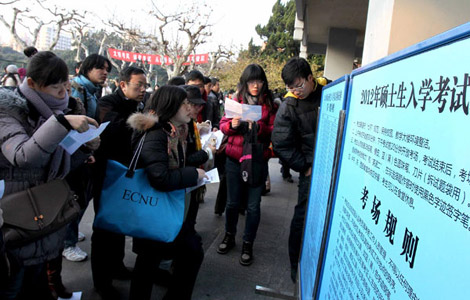PBOC halts bill issue before Lunar New Year
Updated: 2012-01-07 06:31
(Xinhua)
|
|||||||||||
BEIJING - The People's Bank of China (PBOC), the country's central bank, said Friday it will suspend sales of bills in the open market to ensure bank liquidity ahead of the week-long Lunar New Year holiday in late January.
The PBOC said it will conduct short-term reverse-repurchase agreement operations "if necessary" to inject money into banks through purchases of securities with an agreement to resell them at future dates, according to a statement posted on its website.
"The central bank's move to suspend bill sales is intended to prevent a tightening of liquidity in the banking system," said Professor Guo Tianyong, director of the Banking Research Center at the Central University of Finance and Economics.
Increasing demand for cash ahead of the Lunar New Year has already begun to squeeze banks' liquidity.
The PBOC suspended open market operations for two weeks after its last sales of one-year bills for 2011 on Dec 27.
The central bank injected 51 billion yuan ($8.07 billion) into the banking system this week, the biggest liquidity injection in two months, to help banks meet customers' soaring demand for cash during the holiday.
Banks' liquidity is expected to tighten further, as only 75 billion yuan in bills and repurchase agreements will be due in the coming three weeks, experts said.
In the money market, the short-term Shanghai Interbank Offered Rates (Shibor), which measures the cost for banks to borrow from one another as a key barometer of liquidity, were mixed on Friday.
The overnight Shibor slipped 0.21 basis points to 3.99 percent, while the Shibor for one-week and two-week terms fell by 20.34 basis points and 30 basis points to 4.30 percent and 4.61 percent, respectively.
The one-month term Shibor rose 9.89 basis points to 5.94 percent.
"People tend to spend more during the Lunar New Year holiday, adding to banks' pressure to meet customers' cash withdrawal and payment demands," said Zhao Xijun, a finance professor at Renmin University of China.
A falling monetary base due to the shrinking yuan position for foreign currencies over the past two months also led to tighter liquidity in the market, Zhao said.
"The suspension of bill sales shows that the PBOC hopes to stabilize banking liquidity through open market operations, thus reducing the likelihood for the central bank to scale down banks' reserve requirement ratio (RRR) in the near term," Zhao said.
Related Stories
PBOC doubles size of currency swap with Hong Kong 2011-11-23 08:06
PBOC: Too soon to loosen grip on economy 2011-11-17 07:56
Govt warns of payback if yuan bill is passed 2011-11-01 11:07
China's stocks shoot up on PBOC move 2011-12-01 13:51
PBOC poised to fine-tune policy 2011-11-03 20:07
Inflation expectations on the rise: PBOC survey 2011-09-16 09:01
Hot Topics
Kim Jong-il, Mengniu, train crash probe, Vaclav Havel, New Year, coast guard death, Internet security, Mekong River, Strait of Hormuz, economic work conference
Editor's Picks

|

|

|

|

|

|







